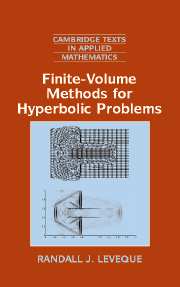Book contents
- Frontmatter
- Contents
- Preface
- 1 Introduction
- Part I Linear Equations
- Part II Nonlinear Equations
- 11 Nonlinear Scalar Conservation Laws
- 12 Finite Volume Methods for Nonlinear Scalar Conservation Laws
- 13 Nonlinear Systems of Conservation Laws
- 14 Gas Dynamics and the Euler Equations
- 15 Finite Volume Methods for Nonlinear Systems
- 16 Some Nonclassical Hyperbolic Problems
- 17 Source Terms and Balance Laws
- Part III Multidimensional Problems
- Bibliography
- Index
16 - Some Nonclassical Hyperbolic Problems
Published online by Cambridge University Press: 05 September 2012
- Frontmatter
- Contents
- Preface
- 1 Introduction
- Part I Linear Equations
- Part II Nonlinear Equations
- 11 Nonlinear Scalar Conservation Laws
- 12 Finite Volume Methods for Nonlinear Scalar Conservation Laws
- 13 Nonlinear Systems of Conservation Laws
- 14 Gas Dynamics and the Euler Equations
- 15 Finite Volume Methods for Nonlinear Systems
- 16 Some Nonclassical Hyperbolic Problems
- 17 Source Terms and Balance Laws
- Part III Multidimensional Problems
- Bibliography
- Index
Summary
In the previous chapters on nonlinear problems we have concentrated on classical systems of conservation laws for which the wave structure is relatively simple. In particular, we have assumed that the system is strictly hyperbolic (so that there are m distinct integral curves through each point of phase space), and that each characteristic field is either linearly degenerate or genuinely nonlinear (so that the eigenvalue is constant or varies monotonically along each integral curve). Many important systems of equations satisfy these conditions, including the shallow water equations and the Euler equations for an ideal gas, as well as linear systems such as acoustics. However, there are other important applications where one or both of these conditions fail to hold, including some problems arising in nonlinear elasticity, porous-media flow, phase transition, and magnetohydrodynamics (MHD). In this chapter we explore a few of the issues that can arise with more general systems. This is only an introduction to some of the difficulties, aimed primarily at explaining why the above assumptions lead to simplifications.
We start by considering scalar conservation laws with nonconvex flux functions (which fail to be genuinely nonlinear because f″(q) vanishes at one or more points). This gives a good indication of the complications that arise also in systems of more equations that fail to be genuinely nonlinear. Then in Section 16.2 we will investigate the complications that can arise if a system is not strictly hyperbolic, i.e., if some of the wave speeds coincide at one or more points in phase space.
- Type
- Chapter
- Information
- Finite Volume Methods for Hyperbolic Problems , pp. 350 - 374Publisher: Cambridge University PressPrint publication year: 2002



